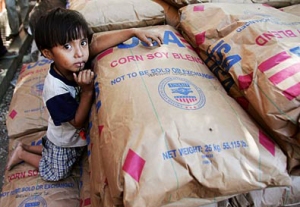Over US$ 100 billion of aid was given out around the world in 2011 (World Bank & IMF, 2012).To me this sheer amount of money illustrates the general global consensus that aid is a good thing. In this blog I will highlight the arguments for aid, and why it is still in use. Then I will give my own opinion on why this aid is in fact rarely helpful. Finally, I will look at the work of Dambisa Moyo and explore the further possibility that aid is actually detrimental to its recipients.
I will not deny aid being essential to saving lives in emergency situations. For example, the 192 doctors the UK government sent over after the 2010 Haiti Earthquake are reported to have treated 23,000 people for cholera (DFID, 2012). However, aid in its most frequent form flows to the most vulnerable communities on a day to day basis, supporting them with everyday life. Adverts of children with flies in their eyes can persuade us to fund such flows, seeing them as critical to the well beings of these peoples. Furthermore the promise of conditional aid where the local authorities are unable to govern in a non-democratic way, assures us that the money will be spent on the correct cause, and may even help improve political systems as well (Vernon, 2010).
These arguments for aid seem strong, particularly when we can see where the money is spent, yet there are also downfalls of aid that make me believe it is not always the best way forward. ‘Aid’ donations can be obstacles to local institutions, for example a local mosquito net seller my loose business when nets are given out for free, preventing the economy form stabilising itself. In such cases as providing mosquito nets, money is also being spent on reducing the impacts of an issue, rather than tackling the root causes, for example by giving out malaria vaccines, making it a more costly and less sustainable approach. Furthermore, even aid that is given in a more sustainable way still may not be desirable. Although the relationships between donor and recipient governments are often referred to as ‘partnerships’ it is clear that these relations, and in particular those involving conditional aid, are sometimes extremely unequal (Riddell, 2009). I would argue that countries and the people within them have the right to shape their own histories. Yet, to my mind the extent of interference of some donors can be compared to imperial ruling, which contrastingly goes against human rights and certainly presents aid as a bad thing.
Dambisa Moyo is a Zambia-born economist and writer who urges a complete phase out of aid to African countries. Moyo highlights that the number of people living in poverty in Africa nearly doubled between 1981 and 2002, meaning that the average citizen living in the continent is now poorer than they were before. Moyo states that as aid continues to flow, the government does not need to raise taxes, and providing it pays the army, does not need to consider its unhappy citizens, making aid the ‘perfect way to keep an inefficient or simply bad government in power’ (Moyo, 2008). By this theory, dependency on aid prevents countries ameliorating their own markets and developing their own economy.
To watch one of Moyo’s contributions to TED please follow: http://www.ted.com/talks/dambisa_moyo_is_china_the_new_idol_for_emerging_economies.html
Overall, I believe aid is still essential in certain situations to provide emergency relief, however it is not the best means of development in the majority of situations. I believe the use of aid to initiate development is rarely effective or sustainable as it rarely helps the people to help themselves, and can even prevent this. Furthermore, employing conditional aid to coerce governments into acting in certain ways is in no way the right approach towards shifting policies, and focus should be put on shifting attitudes. Therefore although I disagree with Moyo that aid is a completely negative idea, I feel it should be phased out in places where it is not essential to make way for projects that better promote development.
Bibliography
DFID (2012) Haiti Earthquake – the UK response https://www.gov.uk/government/news/haiti-earthquake-the-uk-response last accessed 29.12.13
Gallafant, A. (2011) Further reading on China’s investment in Africa … and what it means in TED blogs http://blog.ted.com/2013/11/11/further-reading-on-china-investment-in-africa/ last accessed29.12.13
Moyo, D. (2008), ‘A Brief History of Aid’ in Dead Aid: Why Aid is Not Working and How there is Another Way for Africa, London: Penguin, pp10-28.
Riddell, R. (2009) Is aid working? Is this the right question to be asking? http://www.opendemocracy.net/roger-c-riddell/is-aid-working-is-this-right-question-to-be-asking last accessed 29.12.13
Vernon, P. (2009) Overseas development aid: is it working? http://www.opendemocracy.net/phil-vernon/overseas-development-aid-is-it-working 29.12.13
World Bank and International Monetary Fund (2012) Global Monitoring Report 2012: Food Prices, Nutrition, and the Millennium Development Goals, p147.


I liked that you focused on the possibility that aid might actually be hurting instead of helping since a lot of emphasis is placed on the good aid does normally. It brought a fresh take on the topic. I also enjoyed your choice of video (Ted talks are always really interesting, in my opinion).
I think it could have been made even better if you explained why the relationship between donors and recipients is unequal.
Carnb2Kr